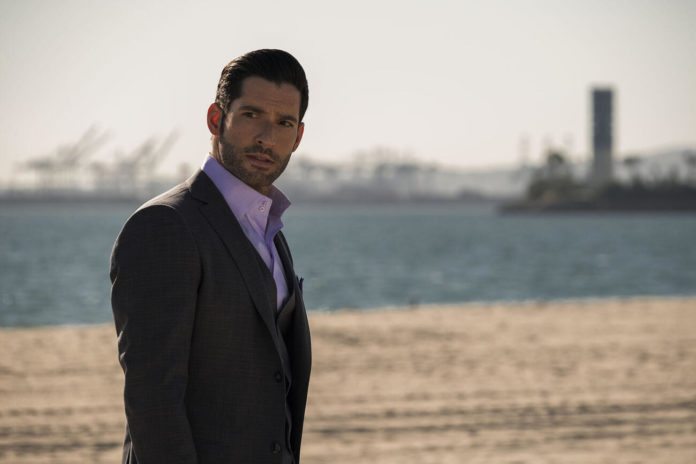“Go to Hell” is, if nothing else, an admirably direct statement. But the story of the addictive Netflix series Lucifer, which imagines the Devil’s life after leaving (and recently returning to) Hell, has been extremely complicated.
Lucifer, which stars Lauren German and Tom Ellis, aired its first three seasons on Fox, which canceled the show just after German’s character, LAPD detective Chloe Decker, found out that her crime-consultant friend Lucifer really was the Devil himself.
To the delight of the Lucifam, Netflix picked up the show for a fourth season. Yay! Then, back in June 2019, fans were told that Lucifer’s fifth season would be its last. Boo! Given how potent the show’s mixture of character development, witty banter, crime-solving, and moral inquiry had become, the news that there would only be 10 more episodes was a bummer.
Apparently Netflix thought so too. Two weeks into coming up with stories for the show’s fifth season, Netflix asked showrunners Ildy Modrovich and Joe Henderson if they could increase the episode count from 10 to 16. Yep, they sure could.
Then, just as Lucifer was heading toward its finish line, the powers that be tossed out another enticing curveball: Could the Lucifer brain trust come up with a sixth season? After giving it some thought, the showrunners said yes again. “Part of why we were so hesitant was because we did not want to let the fans down,” Modrovich recalled.
“We thought on it for a while, and realized we had a story that we wanted to tell, and now we’re deep into that story, and it’s hard to imagine ever not telling it,” Henderson said.
As viewers may recall, at the end of Season 4, Decker finally declared her love for Lucifer — who, devoted as he is to “the Detective,” had to sprint down to Hell to control his restless minions. And as the Season 5 trailer revealed, Lucifer’s identical twin brother, Michael, turns up early in the eight new episodes, which drop Aug. 21. But not only does Season 5 feature Ellis entertainingly pulling double-duty on screen, if you’ve always wanted a beautifully executed film noir episode of Lucifer, you’re also in luck. And in another episode, a showrunner of a program called Lieutenant Diablo is murdered on the Warner Bros. lot, which felt like fan-fiction written just for me.
I interviewed Modrovich and Henderson twice (in January and in August); what follows is an edited version of both conversations.
My first impression of Lucifer was that it was a procedural with banter and witty characters. But over time I’ve realized it’s actually a very sincere show with a lot of heart. Characters have revealed their insecurities and their fears, and their love, too. This show is a big old cornball.
Joe Henderson: It is a big old cornball.
Ildy Modrovich: There’s a strange thing about this show, which is, it’s about God and His sons and daughters. It’s this family, but it’s about angels — the highest, most powerful beings you can imagine. But they all are broken and dysfunctional. And that is relatable.
Henderson: We have a very simple true north, which is: This is the story of an unworthy son who wants to feel loved, wants to feel worthy, wants to feel cared for by his father, by his family, by this woman that he’s met. It all comes down to that very simple idea of someone wanting to be redeemed. And the concept behind that is, if the Devil can be redeemed, so can all of us.
A Second Devil Rises in Lucifer Season 5 Trailer
Given that you’re coming into the home stretch with Lucifer, what are some things you’re most proud of?
Henderson: I’ll just say in Season 1, the piano duel between Lucifer and Father Frank [was important] because that was the first scene that really let us expand what our show could be, and go, “OK, we can have scenes where Lucifer bonds with a guy just by playing piano.” Like, we’re not a police procedural with supernatural touches. We can be a character-based show too, and we can lean into that and the audience will follow us.
Modrovich: I’m proud of the female characters, for sure. They are all unique and different, and through them, you can see that there are many different kinds of women in the world. They’re all pretty multidimensional. And the relationships between them, to me, are as real as they can be. I think there’s not the typical competitive relationship [that you often see on TV]. Everybody’s supportive, but there are rifts between them, and there are misunderstandings between them. But we have a kind of honesty with the female characters, and I’m proud of that.
Lucifer has been through a lot as a show. What evolutions or changes stand out to you?
Modrovich: The first word that pops into my head is freedom. We have just a lot more freedom now. And part of that is not being on a [broadcast] network. But another part of it is that everybody creatively involved trusts each other more, so we can go darker and know that we’re not going to go too dark or alienate anybody. And weirdly, in doing so, I think people do relate to it more, because you can be more raw.
Henderson: I think one of the biggest evolutions of the show was bringing Chloe into the fold of knowing what’s going on [i.e., that Lucifer was being truthful when he told her he is the fallen angel who is the king of Hell]. It was something that we always talked about in early seasons, and for various reasons, we always stepped away from it. Honestly, one of the fears was, “Do we break the show by letting her know the truth?” And every year we’d have a long debate about it. Finally, at the end of Season 3, we were like, “We’re going to do it. We’re going to take a big swing, and we’re going to tell the story.” And instead of making it one episode and then they’re back to normal, we wanted to make that Season 4. That was so freeing and so exciting. That just opened up so much story, and it opened up so much more for Lauren to play. That’s why I think Season 4 was her season, because I think she just destroyed it.

And with the longer running times on Netflix, you can have more serialization, more relationship, and character development, right?
Modrovich: Yeah. Part of it is just the regular evolution of a show. You get to go deeper with characters, because you don’t need to set up stuff anymore. Now you’re just in it. But also, we didn’t have to cut down to an exact time. We could put in more character moments. We could go a little bit further away from the procedural element than we could in the past.
Henderson: We’ve actually tried to restrain ourselves from getting too indulgent. Because the trick of a lengthy run time is you can just fill the entire space, and the trap of that is you might put in things that you should have cut. There is a [benefit] to the network run time, because it forces you to make sure that everything in there is the best. [Sometimes Netflix] will actually encourage us to tighten a bit, and it’s helpful.
As you said, Season 4 had Chloe knowing the truth, and wrestling with the implications of that for both of her and Lucifer. Then at the end of Season 4, she made her big declaration of love to him — and then he kind of ghosted her in Hell.
Henderson: He’s got responsibilities.
Right. So do you see Season 5 as having a strong through-line, as Season 4 did, when Chloe was grappling with the truth?
Henderson: Season 4 was Chloe’s season, and Season 5 is Lucifer’s. Season 4 was teeing up a lot of his realizations, and Season 5 is him having to come face-to-face with them. And we meet Lucifer’s dad. It is Dennis Haysbert. You talk to him and it’s like being in a tractor beam. He’s so good.
Modrovich: He has so much presence and he’s so simultaneously warm — you feel like you’re in this glow. But you also feel this power, strength, and authority.
Henderson: So, a bit of the season [starts to lay out] the sort of original sin, which is the conflict between Lucifer and God — and obviously, between father and son. And one thing we are doing this season is explaining where Chloe fits in with everything and why she affects Lucifer.
Modrovich: In the comics [on which Lucifer is based], the whole theme is free will versus fate or predestination. And that is definitely explored in Season 5, more than we really ever have.
It really seems as though the cast and crew went all out on the film noir episode, there are so many aspects and technical details that were just so pleasing to see. Did you get any extra time for that?
Modrovich: I think we had one extra day of shooting on that — that’s pretty much all you’re going to get, if you get more. But yeah, there was a spring in everybody’s step. Everybody was really into the departure of it, from our production designer Alex Hajdu, to the actors, to the cinematographer, to our director [Viet Nguyen]. The writer, Aiyana White, she showed up to set with a ’40s hat on. Everybody was just into it, there was a lot of excitement.
Henderson: And a lot of shows have done noir episodes. What we wanted to do is make sure that we were doing one that still moved our story forward. [Not just] a fun lark, but also it felt like it was going to affect things later. What I love about the episode is that it is this fun, wonderful departure, but also, [it contains] a kick in the teeth for one of our characters, in an unexpected way.

And the episode in which a showrunner was murdered, was that partly just catharsis for everyone in the writers’ room, sharing the worst stories they had?
Henderson: Yeah, it was a mixture of catharsis and self-parody, right? We wanted to play with that, and the absurdity and wonder of our show. And also, to speak to every meta thing we could. We had a lot of fun playing with that and also trying to make sure that it wasn’t too self-indulgent, while also giving the viewers a little behind-the-scenes glimpse.
Modrovich: It was a pure defensive move on our part, because if we make fun of ourselves first, then no one can make fun of us. That’s our plan.
3 Theories on How Tricia Helfer’s Charlotte Will Return in Lucifer Season 5
It was so much fun, it just felt like it could have been a two-parter, that’s my only note.
Henderson: The number of times we have pitched, what if [we just do a whole] episode of Diablo? We had so much fun, and the doppelgänger characters are so great, and they really had a fun time doing it. I mean, the guy who played Diablo was having the time of his life.
In Season 5, it seems like when Michael shows up, he is an embodiment of the insecurity in Lucifer — it’s like his brother has been living in Lucifer’s head rent-free, you know?
Modrovich: Yeah. Michael is, like you said, kind of the shadow self to Lucifer. But the other fun thing that we’ve loved about bringing Michael in, is that in a way, he’s a sadder sack than Lucifer even is. It almost makes Lucifer look like he had the golden childhood.
Henderson: [Michael is] an externalization of Lucifer’s issues. [We also thought,] what if we can get double the Tom, and just show up how good Tom is? Five seasons of Lucifer, and everyone takes for granted how effortless his performance is. And I feel like getting to have him play a whole different character, against his character, it helps illustrate just how much craft there is in the work he does. I mean, we would have these readings of the episodes, and there was Tom doing entire scenes with himself, going back and forth. We were just, our mouths open, going, “What?!”

And all things considered, it sounds like you’re comfortable with how the show’s endgame plays out now.
Modrovich: [Season 6] did seem sort of like a natural progression of the story we wanted to tell.
Henderson: Yeah. Because the midpoint of our show was Chloe finding out the truth about Lucifer. And that’s [a big part of what] we’ve been trying to do ever since — explore the relationship between Chloe and Lucifer now that she knows the truth.
Regarding the sixth season, when you were presented with that idea, when did you feel you had enough material and enough character stuff to do?
Henderson: Here’s the perfect example, in Season 5, when we expanded to 16, we were terrified of ruining what we thought was the perfect shape. And after spending about 48 hours brainstorming it, we realized that [there was a lot] we could have missed out on, things we wouldn’t have been able to tell. Having those conversations with a room of very smart writers, almost inevitably, you’re going to find [reasons to do] it.
Modrovich: The other reason why we can have more episodes is because it’s not just a one-man show. Every character has such a full life at this point, [it was great] to have enough real estate to explore every aspect of them.
And so now you’re in the home stretch and writing the finale — again. How does that feel?
Henderson: When we found out about Season 5, we were just told it was the final season and honestly, it was nice to know ahead of time, because we were able to craft an ending. We always felt like it should go to six, but we were like, “OK, we can wrap this up in five and still make it very satisfactory.” And so at first, we were just like, do we want to do a Season 6 when we have this perfect ending that we love so much? And we took a couple of days [and realized we really wanted to do it.] I feel like the legacy of a show is so defined by whether it sticks the landing. And that was where our concern came from [when approached about a sixth season] — we felt like we were about to stick the landing and it was, “Do we want to jeopardize that?” But what we realize now is, this is us sticking the landing, and it’s really, really exciting.
Modrovich: And Lucifer getting six seasons — it just sounds right.
The first half of Lucifer Season 5 premieres Friday, Aug. 21 on Netflix.
Source : TVGuide









